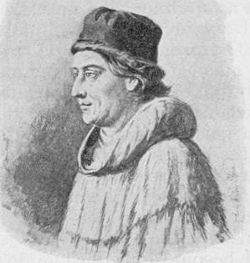
Born: Born: December 1, 1415, Brzeznica, Poland
Died: May 19, 1480, Cracow, Poland
Summary. “Polish diplomat and historian whose monumental history of Poland, the first of its kind, inspired Poles with pride in their past and helped to favourably change the attitude of educated Europeans toward Poland…” (Encyclopedia Britannica)
Early days. He was one of the twelve sons born to a noble family of Jan Dlugosz (coat of arms Wieniawa) from Niedzielsk and of his wife Beata. His father was a subprefect ("starosta") of Brzeznica, a distinction he got in recognition for his bravery in the 1410 battle of Grunwald (Tannenberg). Jan Dlugosz Jr. received his primary education in Nowy Korczyn, then entered the Academy of Cracow, where for three years he studied literature and philosophy. He didn’t get any degree.
Career. In 1433 he entered the service of Bishop of Cracow, Zbigniew Olesnicki, who made him his secretary. In 1437 Dlugosz became a canon of Cracow and the administrator of Olesnicki’s estates. He was ordained priest in 1440. In 1450 Olesnicki dispatched him to Hungary to mediate between Hunyadi and the Bohemian condottiere Giszkra. This was undertaken contrary to the wishes of King Casimir IV of Poland, who was opposed to Olesnicki's ecclesiastical policy. Despite of this Dlugosz did not approve of the provocative attitude of Olesnicki, and frequently and fearlessly remonstrated with him on his conduct. On the other hand regarding the quarrel between Casimir IV and Olesnicki concerning the question of priority between the cardinal and the primate of Poland Dlugosz supported Olesnicki, and even pronounced Casimir worthy of dethronement. Such outbursts against Casimir IV are not infrequent in Dlugosz's Historia Polonica (see below), and his strong personal bias must certainly be taken into consideration in any critical estimate of that famous work. Yet as a high-minded patriot Dlugosz had no sympathy whatever with Olesnicki's opposition to Casimir's IV Prussian policy, and steadily supported the king during the course of the war against the Teutonic knights.
After 1955 (Olesnicki’s death).When Olesnicki died in 1455 he left Dlugosz as his principal executor. The task of administering the cardinal's estate was very difficult, for the family resented Olesnicki’s liberal benefactions to the Church and to the university, and accused Dlugosz of exercising undue influence, from which charge he vindicated himself. Also in 1455 he began to write his Historia Polonica. Dlugosz participated in many foreign missions. He was sent in 1449 to Rome, in 1467 to Bohemia, in 1469 to Hungary and in 1469 to Wyszehrad. Dlugosz's literary labors did not interfere with his political activity. In 1467 the generous and discerning Casimir IV. entrusted Dlugosz with the education of his sons, the eldest of whom, Wladyslaw, at the urgent request of the king, he accompanied to Prague when in 1471 the young prince was elected king of Bohemia. Dlugosz refused the archbishopric of Prague because of his strong dislike of the land of the Hussites; but seven years later he accepted the archbishopric of Lwow. He died soon thereafter and was buried beneath a beautiful church which he founded. It is in Cracow, and is called Na Skalce (meaning, "Upon a Rock", as the church was built on an enormous rock).
Works of Długosz His works offer abundant and reliable material not only for Polish, but also for general, history. He is best known for the Historiae Polonicae libri xii (Annales seu cronicae incliti Regni Poloniae ="Annals or chronicles of the famous Kingdom of Poland") written in 12 books between 1455 and 1480 and covering events in Europe, from 965 to 1480. The first of the numerous imprints of it appeared in 1614, the first complete edition in 1711. The best edition is that in fourteen volumes by Karol Mecherzynski: Joannis Dlugosz Senioris Canonici Cracoviensis Opera Omnia (Cracow, 1863-87). It includes his heraldic work Banderia Prutenorum, also Life of St. Stanislaus, Life of St. Kinga, lives of many Polish bishops (Sees of Wroclaw, Poznan, Plock, Cracow, etc.), Liber beneficiorum diœcesis Cracoviensis, Lites ac rec gestæ inter Polonos ordinemque Cruciferorum. He also translated Wigand of Marburg's Chronica nova Prutenica from Middle High German into Latin.
Sources:
This article uses, among others, material from the Wikipedia article "Jan Dlugosz" licensed under the GNU Free Documentation License. :
Wikipedia
New Advent (Catholic Encyclopedia)
New Poland
Classic Encyclopedia
Britannica Online Encyclopedia
Return to home page:
Prominent Poles